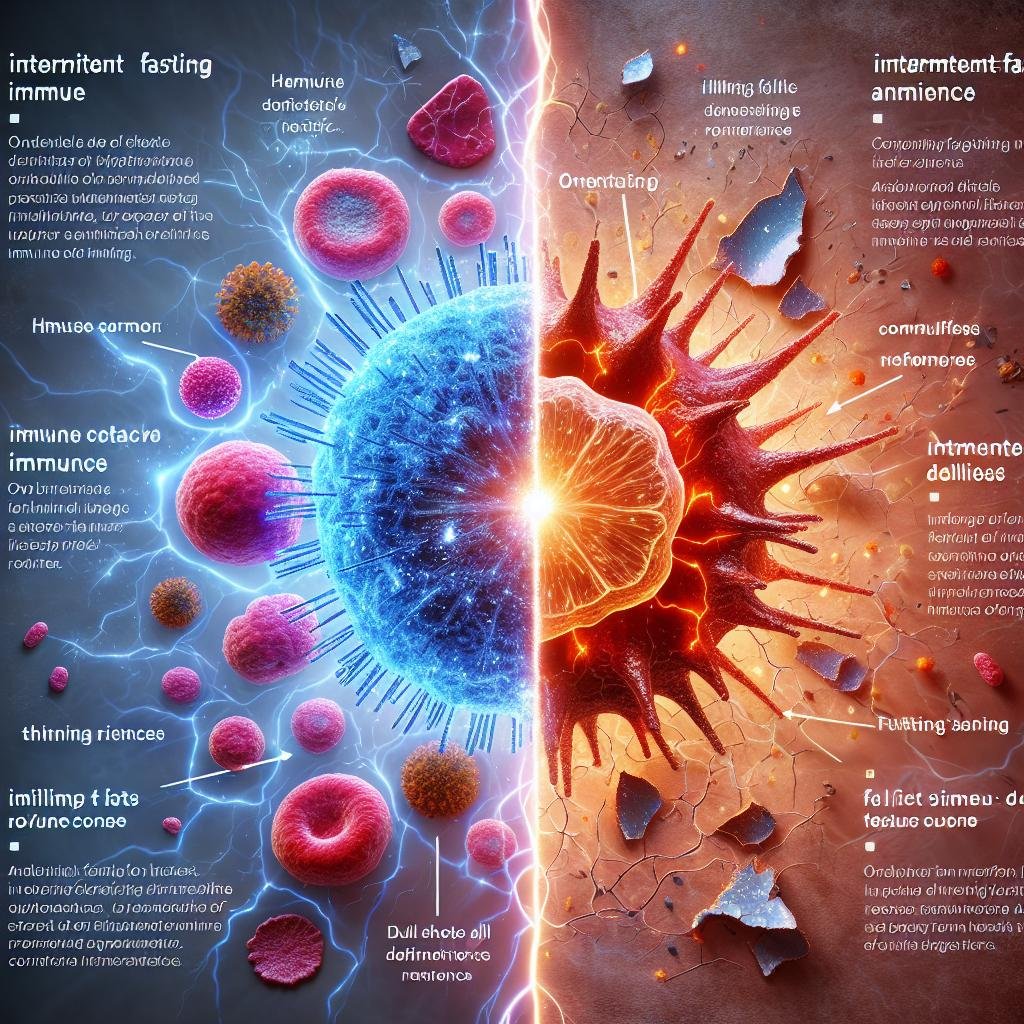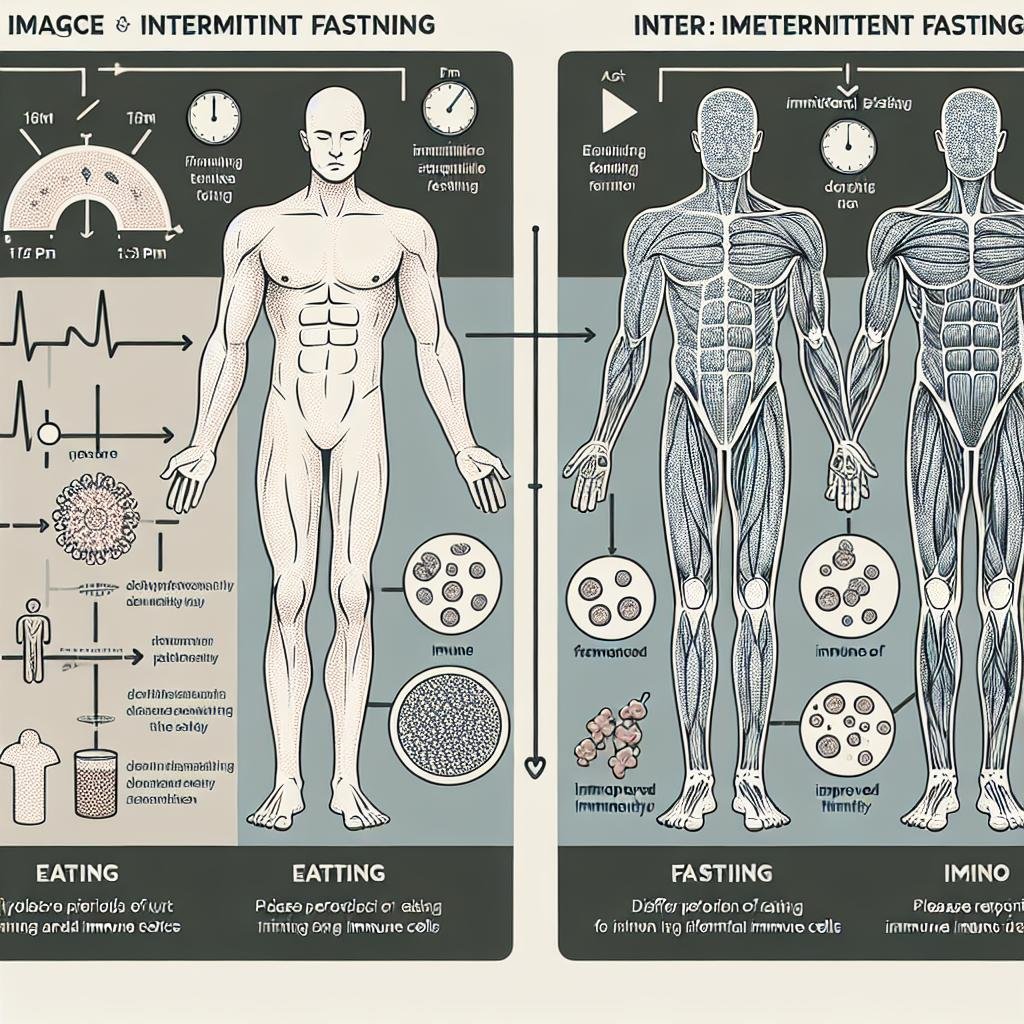In our fast-paced world, where instant gratification often takes precedence, the art of restraint can seem counterintuitive, yet it beckons a growing number of individuals toward the practice of intermittent fasting. Beyond its popularity as a weight management tool, this eating pattern has inspired a fascinating discourse on its potential effects on our bodies, particularly our immune system. Can the cyclical nature of abstaining from food sharpen our resilience to sickness? As researchers uncover the nuances of how fasting influences biological processes, we find ourselves at the intersection of nutrition and immunology, exploring how these ancient dietary practices could hold the key to not just better health, but a more robust immune response. This article delves into the emerging studies that illuminate the intricate connection between intermittent fasting and immune function, revealing insights that might challenge our conventional understanding of diet and health.
Exploring the Science Behind Intermittent Fasting and Immune Modulation
Recent studies have shed light on how intermittent fasting (IF) can serve as a catalyst for enhancing immune function and fostering resilience against various diseases. While the primary appeal of intermittent fasting often revolves around weight management and metabolic health, emerging evidence suggests that it plays a pivotal role in modulating the immune system. This process occurs through mechanisms such as autophagy, where the body cleans out damaged cells and regenerates new ones, effectively bolstering the immune response. Key benefits include:
- Reduction of inflammation: IF may help lower pro-inflammatory cytokines, mitigating chronic inflammation often linked with autoimmune conditions.
- Enhanced stress resistance: It appears to improve cellular repair processes, allowing immune cells to endure and adapt better to stressors.
- Regulation of immune cell distribution: Fasting influences the circulation and function of lymphocytes and other immune components, maintaining a balanced immune environment.
Furthermore, the impact of fasting on gut health also emerges as a crucial factor in immune modulation. The gut microbiota plays a significant role in overall immune health; thus, fasting might promote beneficial microbiome shifts, which could enhance the body’s ability to respond to pathogens. A simplified overview of fasting’s multifaceted effects on immunity can be illustrated in the table below:
| Aspect of Immune Function | Effects of Intermittent Fasting |
|---|---|
| Autophagy Activation | Enhances cellular repair and resilience |
| Inflammatory Response | Decreases inflammatory markers |
| Microbiome Diversity | Promotes a balanced gut microbiota |

Understanding the Role of Nutrient Timing in Immune Resilience
Incorporating nutrient timing into your dietary habits can significantly enhance your immune resilience, particularly during intermittent fasting. The strategic positioning of nutrient intake can maximize the body’s ability to tackle pathogens and maintain overall health. For instance, consuming key nutrients right after fasting periods can bolster the immune system’s effectiveness by:
- Boosting energy levels: Nutrient-dense foods help refuel the body, providing the necessary energy for immune responses.
- Enhancing nutrient absorption: Timing meals post-fast allows the body to efficiently absorb and utilize essential vitamins and minerals.
- Regulating inflammation: Specific nutrients can mitigate inflammation, a common response during immune challenges.
Understanding the timing and combination of nutrients can make a marked difference in immune function. For example, while proteins are crucial for repairing and building tissues, carbohydrates can provide the quick energy to support high-demand immune processes. Below is a simple table illustrating how different nutrients play their roles during periods of fasting:
| Nutrient | Role in Immune Function |
|---|---|
| Vitamin C | Supports the production of white blood cells |
| Zinc | Aids in cellular maturation and function |
| Omega-3 Fatty Acids | Helps reduce inflammation |
| Proteins | Essential for immune system repair |
| Complex Carbohydrates | Provide sustained energy during immune activation |

Practical Strategies for Integrating Intermittent Fasting into Your Lifestyle
Embracing intermittent fasting doesn’t have to be daunting. Start by establishing a fasting schedule that suits your lifestyle—this may involve choosing a specific time window each day, such as 16:8 or 5:2 approaches. Listen to your body; if you feel hungry or fatigued, consider adjusting your schedule. Here are some practical tips to ease into this method:
- Set gradual goals: Begin with a shorter fasting period and incrementally extend it to adapt comfortably.
- Stay hydrated: Drink plenty of water or herbal teas during fasting hours to help curb hunger.
- Plan your meals: Focus on nutrient-dense foods during eating windows to replenish your body’s needs effectively.
To enhance the effectiveness of intermittent fasting, it’s critical to complement it with a balanced lifestyle. Incorporating regular physical activity and mindfulness practices can significantly bolster your immune resilience. Consider the following strategies:
| Activity | Benefit |
|---|---|
| Walking or jogging | Boosts circulation and supports immune function. |
| Yoga or meditation | Reduces stress levels that may weaken immunity. |
| Strength training | Helps in muscle repair and overall health maintenance. |

Potential Risks and Considerations for Immune Health with Intermittent Fasting
While intermittent fasting (IF) offers several benefits for immune function, it is essential to be aware of potential risks that may arise from this dietary practice. Extended periods without food can lead to nutritional deficiencies, particularly if one’s dietary choices during eating windows are not balanced. Insufficient intake of essential vitamins and minerals may compromise immune resilience, thereby increasing susceptibility to infections and illnesses. It’s crucial to focus not only on when to eat but also on what to consume to ensure the immune system has the resources it needs to function properly.
Another important consideration is the psychological impact of intermittent fasting. For some individuals, the restriction of food timing may lead to stress and anxiety, particularly for those with a pre-existing history of eating disorders or disordered eating patterns. This psychological strain can potentially affect overall health and immune responses. It’s advisable for individuals to monitor their mental well-being during fasting periods and to consult health professionals if they experience heightened stress or discomfort.
| Potential Risks | Considerations |
|---|---|
| Nutritional Deficiencies | Ensure balanced intake of nutrients during eating windows |
| Increased Stress | Monitor mental well-being during fasting |
| Disordered Eating Patterns | Consult health professionals if necessary |
The Conclusion
the exploration of intermittent fasting and its influence on immune function unveils a nuanced tapestry of biological responses that merits further attention. As we delve into the evolving landscape of nutrition and health, it becomes clear that the relationship between fasting and immunity is not merely a matter of simple cause and effect. Rather, it is an intricate interplay of cellular signaling, metabolic shifts, and the body’s inherent resilience.
As more individuals turn to intermittent fasting as a lifestyle choice, understanding its potential benefits—and limitations—on our immune system will become increasingly vital. While the research thus far presents promising indications of enhanced immune responses, it is essential to approach these findings with a balanced perspective, recognizing the need for personalized approaches to health.
As we navigate the complexities of our diets and wellness practices, let us remain curious, informed, and open to the possibilities that arise from both age-old traditions and modern science. Ultimately, the journey towards understanding our bodies and their defenses is ongoing, inviting us to continually refine our habits for a healthier future.

